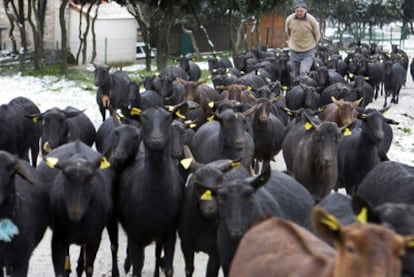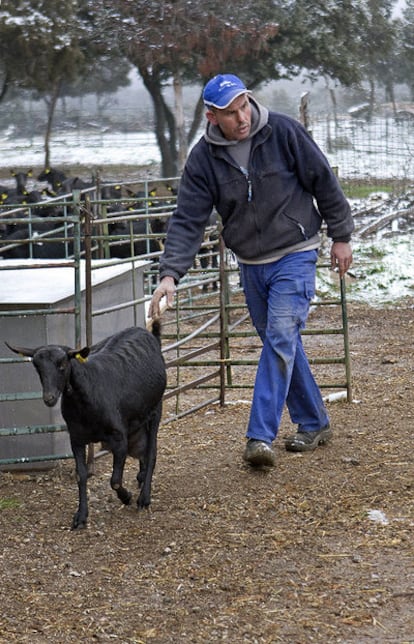When pastoral is cosmopolitan
Most of Madrid region's shepherds hail from far-flung nations
The following is the story of a Romanian shepherd who plays the accordion. His name is Mario Bocan, and he is an agronomist. He worked for five years in Palencia, tending a herd of cows and sheep by day and sleeping in a haystack by night. One day, a 220-pound ram stepped on his toes, breaking two of them. Boca's limp is still noticeable when he walks down the trail to a livestock spread in Colmenar Viejo, in the Madrid region, where he now looks after 600 goats.
Bocan boasts about not using the crook on the animals. "I don't need to. I can call out to any one of them from a 500-meter distance and they recognize my voice. I give them a lot of affection," he says.
There is a sheep branded with the number 33 that he calls Livio, after a good friend of his who lived in a house with that street number. The solitude of the countryside is not a problem for him.
"I don't get bored. I also look after two mares, two donkeys and six cats. They all eat out of my hand. I till and water the earth, keep a vegetable patch and take care of the fruit orchard."
Bocan, who is always in the company of two dogs, gets help from Hafet, a very shy 42-year-old from Morocco. Together they make organic cheese and yogurt that is marketed under the brand Suerte Ampanera, which is the name of the estate they are looking after. Early each morning they have coffee, milk the goats until 11am, and then Bocan takes to the hills with the flock. Shepherds have a special relationship with their dogs, who take orders from nobody else but their owners. The story still gets told about the mastiff who used to stop cars in the middle of the road to let the goats cross. He died after being hit by a car. In some cases, young dogs are tied to the veterans with a rope so they can learn their job first-hand.
Around 70 percent of the few remaining shepherds in the Madrid region - around 1,000 of them, working on 747 sheep farms and 330 goat farms - are immigrants, mostly from the north coast of Africa, according to industry figures. Romanians, Bulgarians and Poles have also worked as drovers in Madrid in the last decades. The average gross salary is 1,500 euros a month, and not everyone has a contract.
Paloma Díez de Tejada, the vet at the regional sanitary defense association - a livestock industry group - says the job is "tough and demanding."
"It requires spending many days out in the fields, whether it's sunny or cold as hell. Livestock farmers had a lot of trouble finding Spanish field hands, and they had to look for foreigners," she says, noting that with a few exceptions, these are unskilled workers who often enough had never seen an animal before in their lives. "There's a really fast turnover. Usually, they leave as soon as they find a more comfortable job. Even in the middle of this crisis, it's hard to find someone who wants to work in the fields."
Bocan, the shepherd who plays the accordion, has been doing this for many years, but he has had companions who lasted no more than a day. Ángel Trujillo, a stockbreeder from Valdemoro, remembers the day a young man arrived at the ranch, shivering with cold. He lent him a jacket, and the youth joined his team of shepherds. A year later he left without saying a word, just like a married couple who worked for him for two years and one day simply disappeared. For a long time now he has been employing four Moroccan shepherds, one of whom, a serious-looking man named Mousa, has been here for eight years, caring for 1,200 head of sheep and goats.
The other members of the team are Mohamed el Mamouni, a drover who is not sure how old he is but can catch rabbits with a sling, Abdul, the young man who reads the Koran, and Mohamed, who used to work at a textiles company. All four live in a house on the property together with a small sheep that acts like a friendly cat.
Things are different in other parts of Spain. Diego Albardonedo, the executive secretary of Ovinos Precoces, a breeders association, says Madrid represents just a small share of the national sheep census: 104,000 head (and 21,500 head of goats). In regions like Extremadura and Andalusia, where there are over two million head of sheep, the number of immigrant shepherds has declined sharply in recent years, especially in the aftermath of the 2006 industry crisis. Unlike Madrid, only a few stockbreeders in these regions employ foreign shepherds.


Tu suscripción se está usando en otro dispositivo
¿Quieres añadir otro usuario a tu suscripción?
Si continúas leyendo en este dispositivo, no se podrá leer en el otro.
FlechaTu suscripción se está usando en otro dispositivo y solo puedes acceder a EL PAÍS desde un dispositivo a la vez.
Si quieres compartir tu cuenta, cambia tu suscripción a la modalidad Premium, así podrás añadir otro usuario. Cada uno accederá con su propia cuenta de email, lo que os permitirá personalizar vuestra experiencia en EL PAÍS.
¿Tienes una suscripción de empresa? Accede aquí para contratar más cuentas.
En el caso de no saber quién está usando tu cuenta, te recomendamos cambiar tu contraseña aquí.
Si decides continuar compartiendo tu cuenta, este mensaje se mostrará en tu dispositivo y en el de la otra persona que está usando tu cuenta de forma indefinida, afectando a tu experiencia de lectura. Puedes consultar aquí los términos y condiciones de la suscripción digital.








































